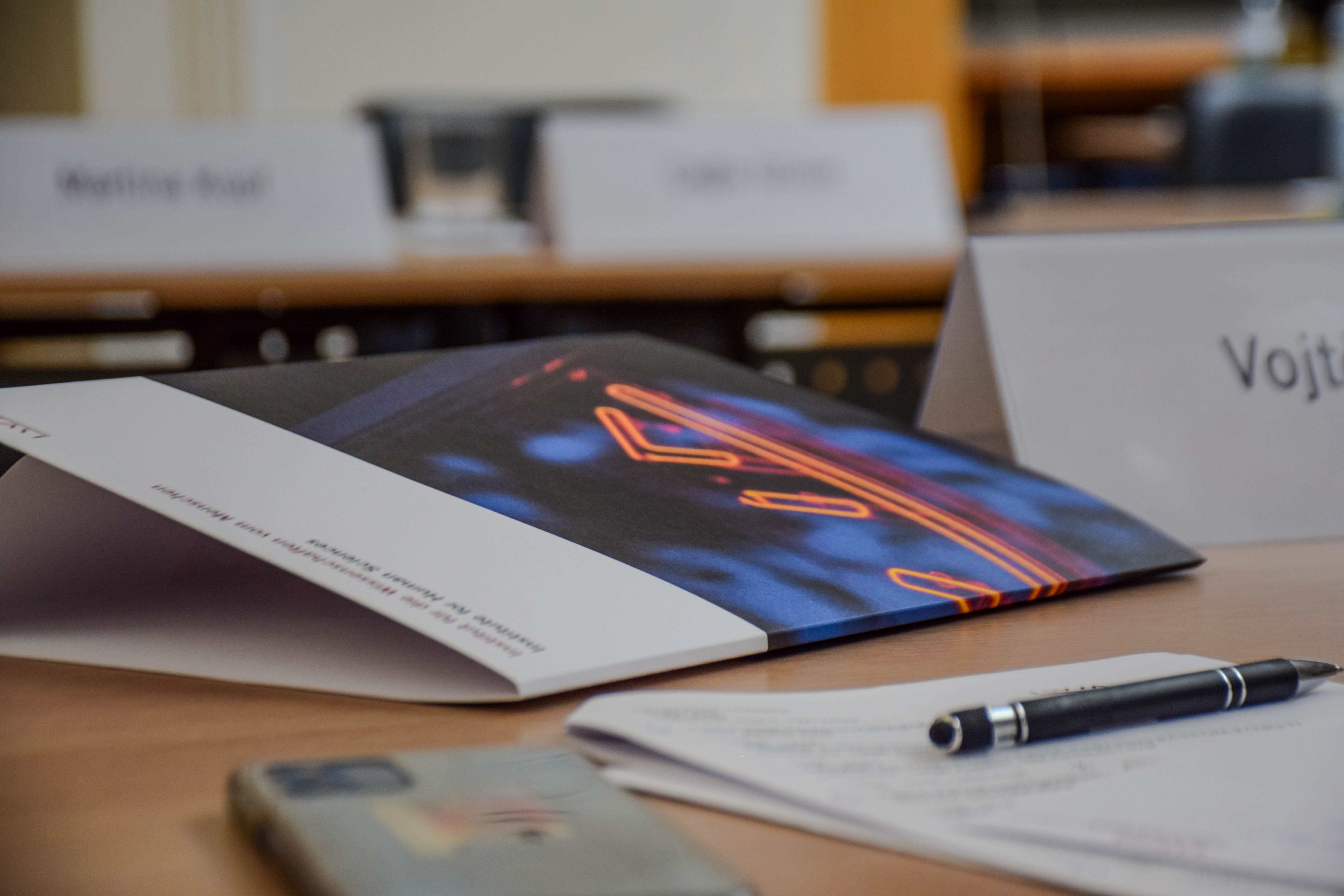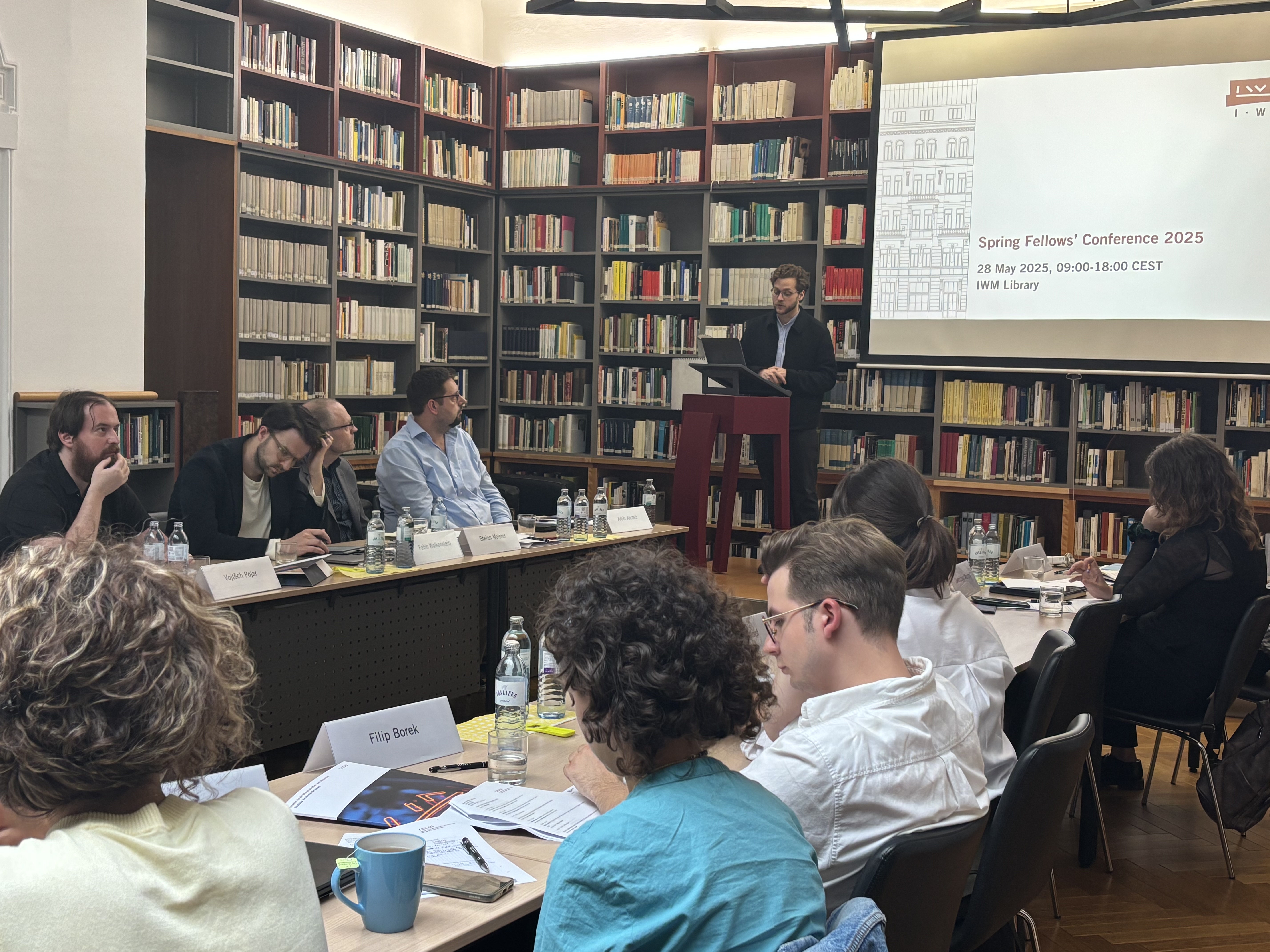
On 28 May, fellows and guests of the Institute gathered for the spring 2025 edition of IWM’s biennial Fellow’s Conference. On this occasion, 11 presenters explored the themes of solidarity and crisis through time and across scales. The presentations, said IWM Permanent Fellow Ludger Hagedorn, came “from quite different fields and scientific backgrounds and displayed a wide range of interests, from current issues of digitization, energy transition, and migration to historical and philosophical reflections connected to Central and Eastern Europe.” Each presentation was followed by a discussant’s comment. Hagedorn said that this made for ”a demanding schedule, however I really think that all talks were engaging and well-prepared, opening space for vivid discussions.” Through the day, senior academics — visiting and permanents fellows, and guests from Vienna’s wider academic milieu — commented on the papers, discussed the papers arguments and methods, and their political implications for the present day. The conference left IWM Permanent Fellow Ayşe Çaglar “with a feeling of wanting to continue the conversations over coffee or at the lunches in the days to come. It left me with a taste and excitement of new beginnings.”
Gwendolyn Murphy kicked off the conference with a talk that addressed the gap between projected global demand for minerals critical to the energy transition, and their known deposits. In the context of twin energy and digital transitions, a repository of comprehensive, global, and real-time data about energy transition minerals could help address issues of deposit governance. However, Murphy argued, a just and equitable transition would require expanding the notion of ‘deposit’ to track minerals recoverable along the existing, wasteful mineral value chains. Data sovereignty, and the architecture of digital commons, she argued, are central to enabling an environmental politics that shifts away from unsustainable extractives models. The paper provoked a spirited discussion with the commentator, IWM Rector Misha Glenny, about the tensions between these proposals for a planetary digital common and the political means that nation-states have at their disposal for securing data sovereignty in a moment of resurgent nationalism.
The debate about the kinds of politics that digital platforms deliberately cultivate or inadvertently enable was extended in two other papers. Ayobami Onanuga explored how Yoruba women in contemporary Nigeria make use of affordances of both globally mediated digital publics and Yoruba media genres to promote female liberation and reclaim sexual agency. Georgian far-right youth, discussed by Nino Gozalishvili, pursue a markedly different politics of social change in online spaces, coordinating to build up an ‘alternative’ civil society that claims to pursue a form of liberation. They draw on emerging political imaginaries of a transnational (‘Western’) far right in order to normalize their political project as mainstream and recruit disproportionately among the Georgian youth.

The themes of political imaginaries and political order echoed through a number of other presentations at the conference. Çagla Güner compared urban strategies of refugee integration in Hamburg and Izmir, contrasting the former municipality’s ‘ pragmatic’ policies of labor-market integration with the latter’s ‘rights-based’ approach. Güner’s relational comparison allowed her to analyze how the institutionalization of solidarity on urban scale is entwined with broader global relations of power that shape the two cities. Sophia Korn echoed other presenters’ contextual approaches when she argued that Rabbi Nachman of Bratzlav's Kabbalistic Tales, which she is translating into the Ukrainian, can be better interpreted by paying attention to non-Hebrew political terms that link the tales to the political realities of the Russian Empire and the Polish-Lithuanian Commonwealth. Arbër Ahmeti and Sofia Merli both considered the issue of political responsibility: the Kosovo Specialist Chambers' role in fulfilling the state's international obligation and responsibility to ensure accountability, in Ahmeti’s case; and Charter 77’s "thick" notion of political responsibility, conceived as an ethos of self-empowerment, individual moral stance, and civic engagement in resistance to an authoritarian regime, in Merli’s case.
Finally, several presenters explored various responses to crises in the history of philosophical and political thought in the short 20th century. Filip Borek examined the promise that the study of the origins of geometry had for Edmund Husserl’s critique of modern mechanized science’s increasing detachment from its roots in the lifeworld. He argued that, in Edmund Husserl’s Crisis of European Sciences and Transcendental Phenomenology, geometrical truths exemplified the constitution of ideal objects of science through a historical process of invention, intersubjectivity, and writing. As an example of scientific invention, geometry helped Husserl critique the detachment of modern mechanized science from its roots in the lifeworld. Turning to an earlier period in Germany, Peter Giraudo explored a different kind of critique of modernity: Max Weber’s defense of trade union socialism. Trade unions were charismatic associations that, Weber hoped, could combat the trends towards bureaucratization and demagogy in German politics before and during WWI. Early 20th-century German environmentalism, which Karolina Jesień explored in her talk, mirrored many of the same concerns with the ills of instrumental rationality. Jesień showed that holistic views of nature were often tied to nationalist ideologies, as seen in the work of Ludwig Klages and Oswald Spengler. In contrast, Walter Benjamin envisioned a ‘planetary body of humankind’ that framed humanity’s relationship to nature beyond national or cultural boundaries. Jesień argued that this planetary perspective offers a critical alternative to nationalist ecological thinking—one that remains urgent in today’s context of global crises.
Concluding the day, Vojtěch Pojar drew on case studies from Czechoslovakia, Hungary, Romania, and Yugoslavia, showing how interventions led by transnationally networked eugenicists aimed to create a new, post-imperial peasantry. He traced how the countryside, symbolically recast as the healthy core of the national — rather than transnational — body, became the focus of competing biopolitical projects of rural regeneration in the wake of imperial collapse. These expert projects largely failed to achieve rural modernization, yet in that failure successfully radicalized and polarized their own expert cultures in ways that tracked with the political crises of interwar Europe.
Commenting on the conference, Pojar, who co-organized it with Peter Giraudo, said: "The conference showcased how the broad multidisciplinary scope of the junior fellows' research at the Institute can go hand in hand with intellectual depth and a curiosity to cross disciplinary boundaries and epistemic comfort zones.” Ayşe Çaglar added: “I wondered what kind of new paths we would see if we juxtaposed the discussions of the digital activism of Yoruba women in Nigeria and their imaginaries of their sexual agency and the digital platforms of the Georgian [far right] youth to explore the transnational sources of their narratives? I imagined looking at Patočka’s language of rights and concept of solidarity, which Sofia Merli elegantly addressed, through the lens of ‘institutionalized solidarity’ and its different pathways Cagla Guner explored in urban governance.”
Reflections by Taras Fedirko, IWM Senior Research Fellow